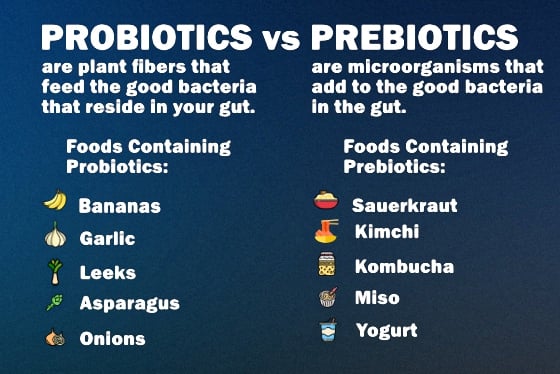
Probiotics vs Prebiotics: What’s the Difference?
Probiotics are naturally occurring bacteria that live on the lining of the intestinal tract. These beneficial bacteria aid in the digestion and absorption of food. People can take probiotics in supplement form and can also be found in a variety of foods. Prebiotics are a good companion to probiotic supplements and help digest and produce probiotic bacteria. When taken through a food source or supplement, prebiotics can increase the efficacy of probiotics. Believe it or not, our bodies need bacteria. Often discounted as a dirty word, bacteria, or rather good bacteria, play an essential function in the health of our gut and immune system. An additional supplement that compliments probiotics are prebiotics. Here is a breakdown of the differences between probiotics and prebiotics and their potential benefits when used together:
- What are Probiotics?
- What are Prebiotics?
- How Probiotics and Prebiotics Can Help Improve Gut and Overall Health
- Trusting Your Gut: Are Probiotics and Prebiotics Right for You?
What are Probiotics?
On our intestinal tract lining live two main types of probiotic bacteria, Lactobacillus and Bifidobacterium. These probiotic bacteria work hard to maintain optimal gut health. They also aid good digestion. Probiotics are so important to the health of our gut that they are often referred to as “friendly” bacteria. Naturally occurring probiotic bacteria grow and live in our gut. When properly fed, they aid in the digestion process. They also create vital nutrients and vitamins, help fight off bad bacteria, and support the cells on the lining of our stomach and intestines. Probiotic supplements or foods are created by taking live microorganisms found in the human body and isolating them. Probiotics also occur naturally in fermented foods such as yogurt, pickles, cheese, kombucha, sauerkraut and kimchi.
What are Prebiotics?
Prebiotics work differently than probiotics due to the inability of our digestive system to break them down. Unlike probiotics, prebiotics do not contain bacteria. Instead, they are a type of dietary fiber that acts as food for probiotic bacteria. Prebiotics can be consumed as a food additive or supplement and are processed by our digestive tract, where they make their way to our colon and help probiotic bacteria grow. Prebiotics, like probiotics, are also found in foods such as garlic, artichokes, leeks, bananas, asparagus and onions.
How Probiotics and Prebiotics Can Help Improve Gut and Overall Health
Whenever there is an imbalance in our gut’s bacteria, the immediate symptoms can present themselves as diarrhea, heartburn, and occasional constipation. However, a lack of good gut bacteria has also been linked to fatigue, sluggishness, mood, and occasional sleeplessness. Other overlooked symptoms of an imbalance of gut bacteria can sometimes include a lack of sleep, allergies, skin rashes, sugar cravings, and noticeable moods. Additionally, bad gut health symptoms can also show up with autoimmune concerns. Microbiome therapy or the use of probiotics and prebiotics have been known to help restore this bacterial balance. This can aid in curbing intestinal issues and may help ease related symptoms. Additionally, healthy gut bacteria help produce higher serotonin levels in our brains, boosting our mood levels.
Trusting Your Gut: Are Probiotics and Prebiotics Right for You?
Ideally, we should consume 25 to 35 grams of fiber to maintain a healthy level of gut bacteria. However, environmental stressors, prescribed dietary restrictions, and the normal daily demands of life can get in the way. The function of our gut bacteria can play a larger role in our overall health. And this fact has not gone unnoticed as an estimated 4 million people are currently taking a probiotic supplement, according to a National Institute of Health (NIH) study. Some recent research has suggested that the use of probiotics and prebiotics have shown to have a positive impact in improving and supporting overall health. Currently, the U.S. Food and Drug Administration considers probiotics a nutritional supplement, so it is not currently regulated as a “drug.” While probiotics and prebiotics are not intended as a cure or a drug, both have been shown to impact gut health and symptoms associated with intestinal issues and better overall health.
Frequently Asked Questions about Probiotics and Prebiotics:
How do know if I need probiotics or prebiotics?
Since both have been shown to keep our intestinal tract in good health, and both naturally occur in the body, both are needed. They can be helpful when replenished by foods or in supplement form.
Can probiotics and prebiotics be taken at the same time?
Not only can probiotics and prebiotics be taken together, they are most beneficial to your body when combined. The process of taking them at the same time is called microbiome therapy.
What are the signs of a lack of probiotics and prebiotics?
There are many signs that your body might need probiotics and prebiotics. Some signs may include sluggish metabolism, unusual sugar cravings, and persistent digestive issues such as heartburn, occasional constipation and diarrhea.



